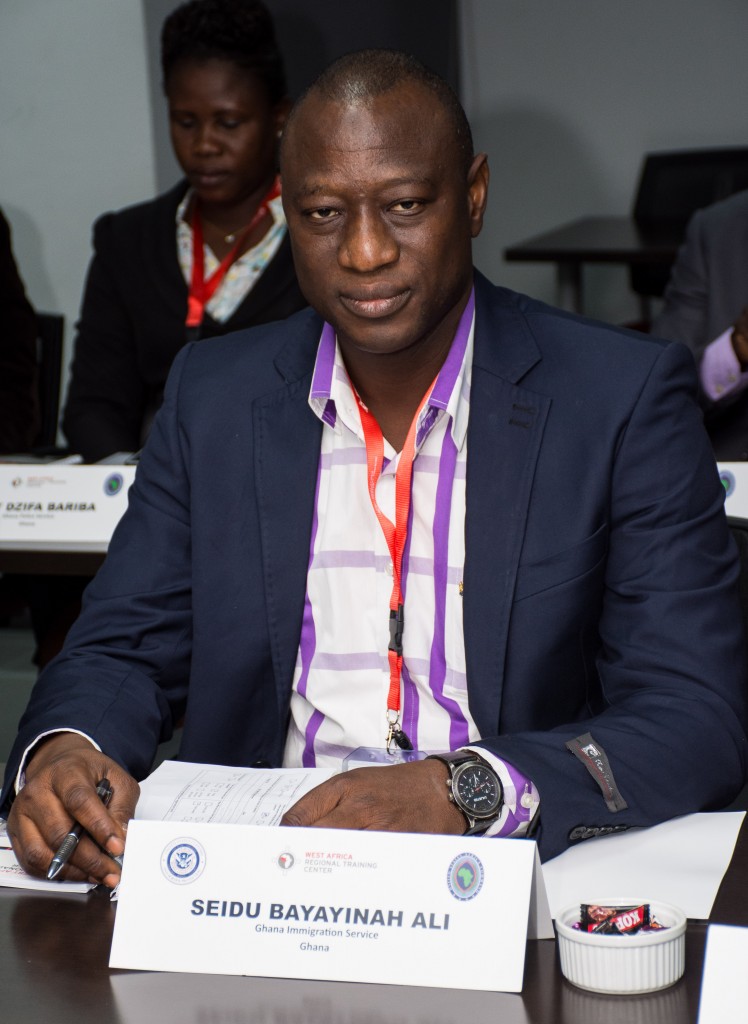Alumni in Focus
Mr. Bayanyinah

Mr. Bayanyinah
Superintendent of Immigraion
We value the constructive feedback we receive from our alumni through email and social media. Remember that the RTC is just an email away. Contact the RTC at info@westafricartc.org and let’s get talking. This month, we are proud to feature Mr. Bayanyinah, an alumnus of the RTC. Do enjoy the read.
Can you briefly introduce yourself, focusing on your law enforcement career?
Mr. Bayanyinah at the RTC during the International Passenger Interdiction training In August
My name is Superintendent Bayanyinah with the Ghana Immigration Service. I have been working with the Service since October 2004. I had the opportunity to attend a training course at the International Law Enforcement Academy (ILEA) in Gaborone, Botswana on small arms, light weapons and explosives in July 2011. Thankfully, this year I had another opportunity to attend two training sessions at the West Africa Regional Training Center (RTC) in Accra, Ghana. The first one was on International Air Cargo Interdiction and Fraudulent Document in May and the second was on International Passenger Interdiction Training II in August.
Can you please share some of the experiences you have had working with the Ghana Immigration Service at the Kotoka International Airport and some of the challenges you usually face in your day-to-day activities?
As a Chief Supervisor at the Kotoka International Airport (KIA) for general operation duties, the RTC training on passenger interdiction enhanced my passenger profiling skills. Also, my skills in targeting and link analyses of passengers disembarking or embarking a flight have improved. The huge task of having to profile every passenger before embarkation or disembarkation has been made professionally simple. With the skills acquired, I have been able to intercept a number of suspicious characters for further document fraud examinations. In fact, most of the suspects whose cases were referred to the Document Fraud Unit were either refused entry or failed departure formalities.
Another case was a Ghanaian bio metric passport that had been altered and superimposed with an imposter's picture to enable travel to Saudi Arabia for domestic house help job. This was a suspected case of human smuggling and/or trafficking. All these suspects were not allowed to travel but were all directed to the appropriate office for further interrogations.
One of the biggest challenges I face daily is lack of cooperation from some officers in the discharge of their duties. These offices sometimes are very reluctant to provide assistance when needed. Another challenge is the lack of certain basic tools to conduct further investigations on suspects. For this reason, we are compelled to send these suspects to a special office for further interrogation. At this point, we find it very difficult to follow up on the progress of the case for detailed reporting due to bureaucracy. And even if we were able to go through this bureaucratic process, we were either told “the passenger has been cleared and has boarded his flight” or “the passenger was not able to make it and that the case has been referred to a higher authority.” This lack of cooperation undermines our efforts and makes our work very difficult.
About the trainings you received at the RTC, would you say that they have enhanced your skills set?
The training received from the RTC has really enhanced my skills and improved my work in various forms. The training at the RTC has helped shape my skills in documents fraud detection. As my core duty is focused on profiling passengers and their documents, either before embarking or disembarking,it has also made it easier for me to detect alterations and page substitutions on the bio data pages of every passport. A typical example is the case of a passenger with dual citizenship (Ghana and UK) who had different dates of birth in each passport. There have been numerous examples of such cases that more mostly referred to the Document Fraud Unit of the Ghana Immigration Service for further investigations. These investigations go a step further into how the holder acquired the fraudulent document.
The RTC constantly emphasizes the need for regional and inter agency cooperation in the fight against transnational organized crime. Based on your work and current trends, would you agree with the need for collaboration?
I agree fully with the suggestion for inter agency and regional cooperation to fight against all forms of crime like drugs, human trafficking etc. Cooperation among agencies in the region helps in facilitating intelligence gathering and sharing for prompt actions on cases under investigations. It also enhances communication and interactions among agencies
Finally, if you could request additional training, what would be your top training needs?
Given the opportunity to suggest other top training programs at the RTC, I would wish to recommend a training program on how to counter terrorist attack at the airport. Secondly, I would also like to suggest a training module on how to manage emergency situation of any kind at the airport.
Post by Collins Agyare . Collins is one of the Delegate/Alumni Coordinators at the West Africa Regional Training Center. Email him at info@westafricartc.org
